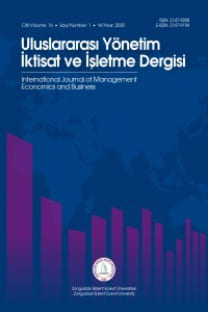An Empirical Study on Quality Management Practices in Turkey
Kalite, TKY, ISO 9000 ve KOBİ
AN EMPIRICAL STUDY ON QUALITY MANAGEMENT PRACTICES IN TURKEY
Quality, TQM, ISO 9000 and SME,
___
- Baş, T. (2003), “A Quality Measurement Framework for Turkish Firms: Validation of an Instrument”, 11 th National Management and Organzation Congress, Afyon, Turkey, pp. 213-20.
- Beattie, K.R. and Sohal, A.S. (1999), “Implementing ISO 9000: a Study of its Benefits among Australian Organizations”, Total Quality Management, Vol. 10, pp. 95-106.
- Çalışır, F., Bayraktar, C. A. and Beskese, B. (2001), “Implementing the ISO 9000 Standards in Turkey: A Study of Large Companies’ Satisfaction with ISO 9000”, Total Quality Management, Vol. 4, pp. 429-438.
- Cronbach, L.J. (1984), Essentials of Psychological Testing, Harper and Row, New York.
- Fink, A. and Kosecoff, J. (1995), How to Conduct Surveys: A Step by Step Guide Sage, Thousand Oaks.
- Lee, K.S. and Palmer, E. (1999), “An Emprical Examination of ISO 9000 Registered Companies in New Zealand”, Total Quality Management, Vol. 10, pp. 887- 899.
- Mellahi, K. and Eyüboğlu, F. (2001), “Critical Factors for Successful Total Quality Management Implementation in Turkey: Evidence from Banking Sector”, Total Quality Management, Vol. 6, pp. 745-756.
- Saraph, J.V., Benson, P.G. and Schroder, R.G. (1989), “An Instrument for Measuring the Critical Factors of Quality Management”, Decision Sciences, Vol. 4, pp. 810-829.
- Shih, L., Huarng, F. and Lin, B. (1996), “ISO in Taiwan: a Survey”, Total Quality Management, Vol. 7, pp. 681-690.
- ISSN: 2147-9208
- Yayın Aralığı: 4
- Başlangıç: 2005
- Yayıncı: Zonguldak Bülent Ecevit Üniversitesi
Sağlık İşletmeleri İçin Kurumsal İmajın Temel Belirleyicileri: Tüketici Değerlemeleri
Ramazan AKSOY, Vecdi BAYRAMOĞLU
İşletmelerde Öğrenen Örgütler Yaklaşımı
İŞLETMELERDE STRATEJİK YÖNETİMİN ETKİNLİĞİNİ ARTIRMADA ÖNEMLİ BİR ARAÇ: BENCHMARKING
İşletme Perspektifinden Sosyal Sorumluluk Teorisinin İncelenmesi
An Empirical Study on Quality Management Practices in Turkey
PARA, FİYATLAR VE ÇIKTI ARASINDAKİ UZUN-DÖNEMLİ İLİŞKİLER: TÜRKİYE ÖRNEĞİ
Ali Sait ALBAYRAK, Ramazan AKBULUT
Kurumsallaşmanın Küçük ve Orta Ölçekli İşletmelerin Performansına Etkileri
